2010年中考听力题点拨
- 格式:doc
- 大小:82.00 KB
- 文档页数:14
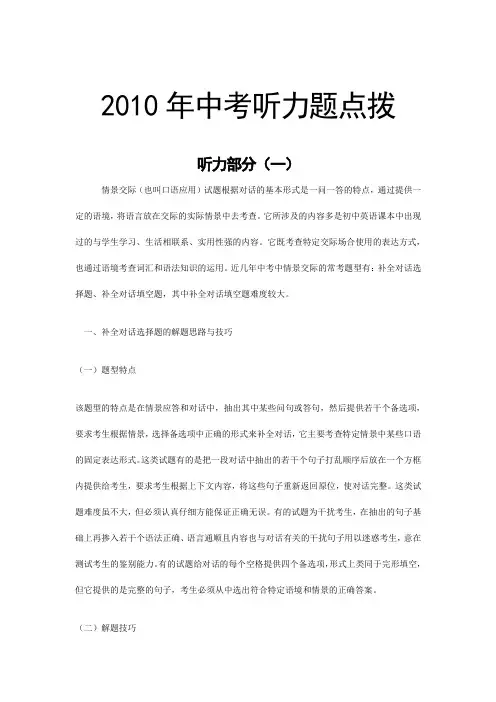
2010年中考听力题点拨听力部分(一)情景交际(也叫口语应用)试题根据对话的基本形式是一问一答的特点,通过提供一定的语境,将语言放在交际的实际情景中去考查。
它所涉及的内容多是初中英语课本中出现过的与学生学习、生活相联系、实用性强的内容。
它既考查特定交际场合使用的表达方式,也通过语境考查词汇和语法知识的运用。
近几年中考中情景交际的常考题型有:补全对话选择题、补全对话填空题,其中补全对话填空题难度较大。
一、补全对话选择题的解题思路与技巧(一)题型特点该题型的特点是在情景应答和对话中,抽出其中某些问句或答句,然后提供若干个备选项,要求考生根据情景,选择备选项中正确的形式来补全对话,它主要考查特定情景中某些口语的固定表达形式。
这类试题有的是把一段对话中抽出的若干个句子打乱顺序后放在一个方框内提供给考生,要求考生根据上下文内容,将这些句子重新返回原位,使对话完整。
这类试题难度虽不大,但必须认真仔细方能保证正确无误。
有的试题为干扰考生,在抽出的句子基础上再掺入若干个语法正确、语言通顺且内容也与对话有关的干扰句子用以迷惑考生,意在测试考生的鉴别能力。
有的试题给对话的每个空格提供四个备选项,形式上类同于完形填空,但它提供的是完整的句子,考生必须从中选出符合特定语境和情景的正确答案。
(二)解题技巧1. 通览全文,领会大意,揣摩话题。
解题时应先跳过空格通览全文,了解对话大意,根据对大意的把握,判定语境,揣摩话题。
2. 根据语境,细读选项,选择答案。
在把握话题和语境的基础上,针对对话的每一空白处,细读所提供的选项,认真分析它们之间的异同,依据对话有关情景内容,选择正确的答案。
3. 通盘考虑,前后联想,先易后难。
要从对话整体理解出发,依照上、下问答的逻辑顺序来考虑所选择的答案,不可不顾前后顺序,孤立地就上句就补下句,这样可能出现所补句子符合上文而不符合下文的情况。
要先解决有把握的、容易的,再回头补选较难的。
4. 通读对话,义形结合,验证答案。
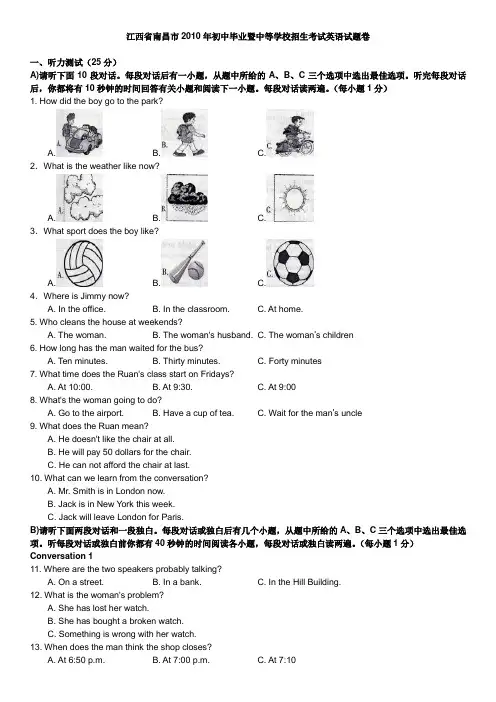
江西省南昌市2010年初中毕业暨中等学校招生考试英语试题卷一、听力测试(25分)A)请听下面10段对话。
每段对话后有一小题,从题中所给的A、B、C三个选项中选出最佳选项。
听完每段对话后,你都将有10秒钟的时间回答有关小题和阅读下一小题。
每段对话读两遍。
(每小题1分)1. How did the boy go to the park?A. B. C.2.What is the weather like now?A. B. C.3.What sport does the boy like?A. B. C.4.Where is Jimmy now?A. In the office.B. In the classroom.C. At home.5. Who cleans the house at weekends?A. The woman.B. The woman's husband.C. The woman’s children6. How long has the man waited for the bus?A. Ten minutes.B. Thirty minutes.C. Forty minutes7. What time does the Ruan's class start on Fridays?A. At 10:00.B. At 9:30.C. At 9:008. What's the woman going to do?A. Go to the airport.B. Have a cup of tea.C. Wait for the man’s uncle9. What does the Ruan mean?A. He doesn't like the chair at all.B. He will pay 50 dollars for the chair.C. He can not afford the chair at last.10. What can we learn from the conversation?A. Mr. Smith is in London now.B. Jack is in New York this week.C. Jack will leave London for Paris.B)请听下面两段对话和一段独白。
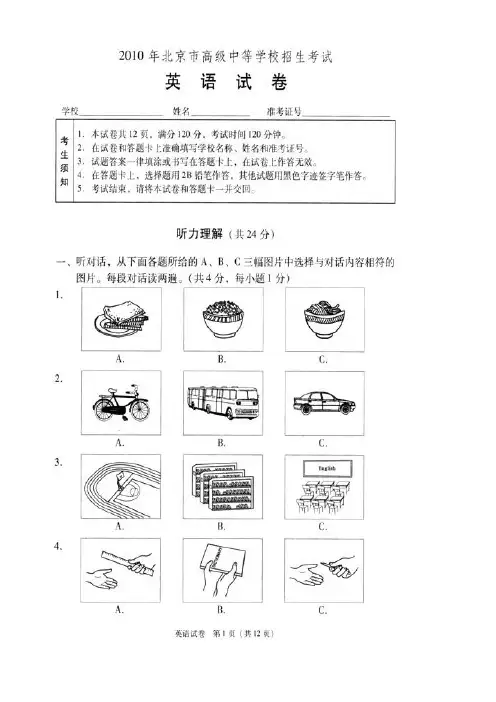
2010年河北省初中毕业生升学文化课考试Ⅰ. 听句子,选出句子中所包含的信息。
(共 5 小题,每小题1 分,计 5 分)1. A. ice B. rice C. voice2. A. E2CR3F B. B2CR7F C. B2OR6F3. A. talking on the phone B. waiting for a phone C. shouting at the phone4. A. Jim is younger. B. Tony is younger. C. They are the same age.5. A. Laugh is good medicine.B. Always take cheap medicine.C. Medicine can make you laugh.Ⅱ. 听句子,选出该句的最佳答语。
(共 5 小题,每小题1 分,计 5 分)6. A. You are so kind. B. Thanks, you too! C. That would be fine.7. A. I play the piano. B. I go to work. C. I’m a policeman.8. A. Twenty-eight yuan. B. Three hundred miles. C. Two and a half years.9. A. Yes, please. B. Sorry, I can’t. C. Never mind.10. A. But it is not true. B. I don’t believe in God. C. Wow, it’s already 12 o’clock!Ⅲ. 听对话和问题,选择正确的选项。
(共 5 小题,每小题1 分,计 5 分)11. A. A cookbook. B. A storybook. C. A picture book.12. A. She is angry. B. She is not hungry. C. She has a stomachache.13. A. On Monday. B. On Wednesday. C. On Thursday.14.A B C15.A B CⅣ. 听语段、对话和问题,选择正确答案。
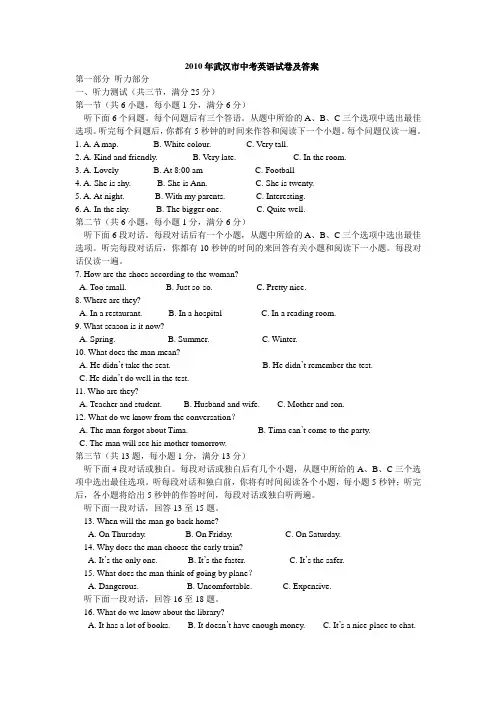
2010年武汉市中考英语试卷及答案第一部分听力部分一、听力测试(共三节,满分25分)第一节(共6小题,每小题1分,满分6分)听下面6个问题。
每个问题后有三个答语。
从题中所给的A、B、C三个选项中选出最佳选项。
听完每个问题后,你都有5秒钟的时间来作答和阅读下一个小题。
每个问题仅读一遍。
1. A. A map. B. White colour. C. Very tall.2. A. Kind and friendly. B. Very late. C. In the room.3. A. Lovely B. At 8:00 am C. Football4. A. She is shy. B. She is Ann. C. She is twenty.5. A. At night. B. With my parents. C. Interesting.6. A. In the sky. B. The bigger one. C. Quite well.第二节(共6小题,每小题1分,满分6分)听下面6段对话。
每段对话后有一个小题,从题中所给的A、B、C三个选项中选出最佳选项。
听完每段对话后,你都有10秒钟的时间的来回答有关小题和阅读下一小题。
每段对话仅读一遍。
7. How are the shoes according to the woman?A. Too small.B. Just so-so.C. Pretty nice.8. Where are they?A. In a restaurant.B. In a hospitalC. In a reading room.9. What season is it now?A. Spring.B. Summer.C. Winter.10. What does the man mean?A. He didn‘t take the seat.B. He didn‘t remember the test.C. He didn‘t do well in the test.11. Who are they?A. Teacher and student.B. Husband and wife.C. Mother and son.12. What do we know from the conversation?A. The man forgot about Tima.B. Tima can‘t come to the party.C. The man will see his mother tomorrow.第三节(共13题,每小题1分,满分13分)听下面4段对话或独白。
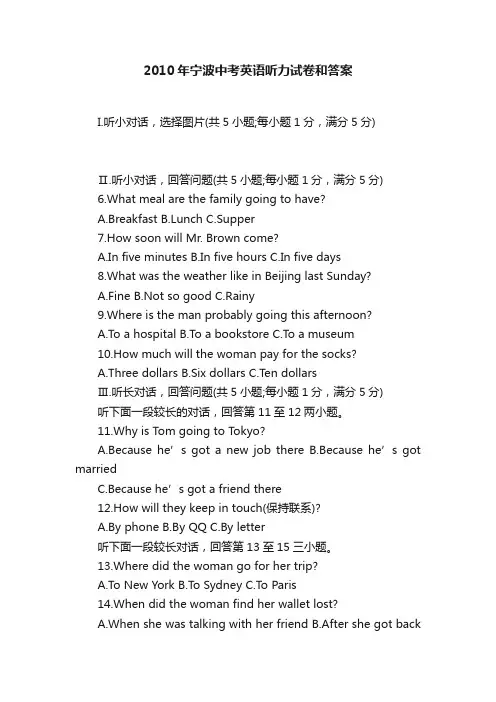
2010年宁波中考英语听力试卷和答案I.听小对话,选择图片(共5小题;每小题1分,满分5分)Ⅱ.听小对话,回答问题(共5小题;每小题1分,满分5分)6.What meal are the family going to have?A.BreakfastB.LunchC.Supper7.How soon will Mr. Brown come?A.In five minutesB.In five hoursC.In five days8.What was the weather like in Beijing last Sunday?A.FineB.Not so goodC.Rainy9.Where is the man probably going this afternoon?A.To a hospitalB.T o a bookstoreC.T o a museum10.How much will the woman pay for the socks?A.Three dollarsB.Six dollarsC.Ten dollarsⅢ.听长对话,回答问题(共5小题;每小题1分,满分5分)听下面一段较长的对话,回答第11至12两小题。
11.Why is Tom going to Tokyo?A.Because he’s got a new job thereB.Because he’s got marriedC.Because he’s got a friend there12.How will they keep in touch(保持联系)?A.By phoneB.By QQC.By letter听下面一段较长对话,回答第13至15三小题。
13.Where did the woman go for her trip?A.To New YorkB.T o SydneyC.To Paris14.When did the woman find her wallet lost?A.When she was talking with her friendB.After she got backfrom her tripC.When she was going to pay for the ticket15.How did the woman come back?A.By trainB.In her friend’s carC.By airⅣ.听短文。
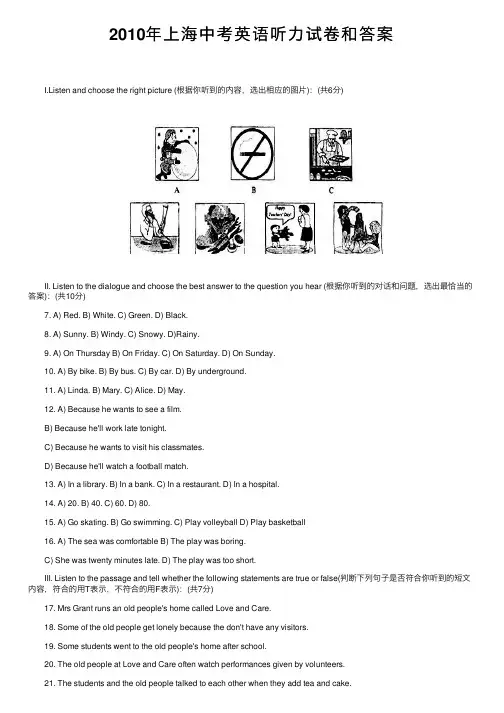
2010年上海中考英语听⼒试卷和答案 I.Listen and choose the right picture (根据你听到的内容,选出相应的图⽚):(共6分) II. Listen to the dialogue and choose the best answer to the question you hear (根据你听到的对话和问题,选出最恰当的答案):(共10分) 7. A) Red. B) White. C) Green. D) Black. 8. A) Sunny. B) Windy. C) Snowy. D)Rainy. 9. A) On Thursday B) On Friday. C) On Saturday. D) On Sunday. 10. A) By bike. B) By bus. C) By car. D) By underground. 11. A) Linda. B) Mary. C) Alice. D) May. 12. A) Because he wants to see a film. B) Because he'll work late tonight. C) Because he wants to visit his classmates. D) Because he'll watch a football match. 13. A) In a library. B) In a bank. C) In a restaurant. D) In a hospital. 14. A) 20. B) 40. C) 60. D) 80. 15. A) Go skating. B) Go swimming. C) Play volleyball D) Play basketball 16. A) The sea was comfortable B) The play was boring. C) She was twenty minutes late. D) The play was too short. III. Listen to the passage and tell whether the following statements are true or false(判断下列句⼦是否符合你听到的短⽂内容,符合的⽤T表⽰,不符合的⽤F表⽰):(共7分) 17. Mrs Grant runs an old people's home called Love and Care. 18. Some of the old people get lonely because the don't have any visitors. 19. Some students went to the old people's home after school. 20. The old people at Love and Care often watch performances given by volunteers. 21. The students and the old people talked to each other when they add tea and cake. 22. All the old people joined the students in the singing and dancing. 23. The passage is mainly about how to run an old people's home. IV. Listen to the passage and complete the following sentences. (听短⽂,完成下列内容,每空格限填⼀词):(共7分) 24. It is a _______ book for children. Its home is in the library. 25. The book stayed in a factory for _______ weeks before it went to a new place. 26. The book went to the library and others were _______ away to book shops. 27. Some people take good care of the book and turn its pages _______. 28. Other people are bad to the book and they read it with _______ hands. 29. Some people throw the book away in the _______ when they want to sleep. 30. The colours on its cover were _______. Now they have turned pale. 参考答案: 1-6 DBFCAE 7-16 CDABCDCBAB 17-23 FTTFTFF 24-30 story, five, sent, softly, dirty, bedroom, bright。
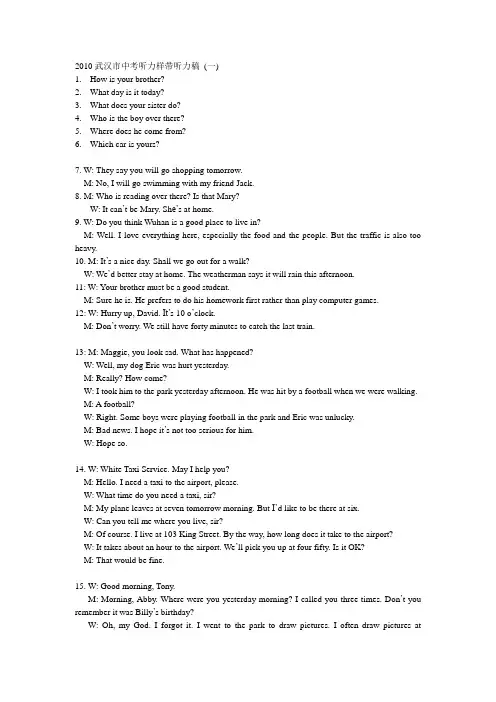
2010武汉市中考听力样带听力稿(一)1.How is your brother?2.What day is it today?3.What does your sister do?4.Who is the boy over there?5.Where does he come from?6.Which car is yours?7. W: They say you will go shopping tomorrow.M: No, I will go swimming with my friend Jack.8. M: Who is reading over there? Is that Mary?W: It can‟t be Mary. Sh e‟s at home.9. W: Do you think Wuhan is a good place to live in?M: Well. I love everything here, especially the food and the people. But the traffic is also too heavy.10. M: It‟s a nice day. Shall we go out for a walk?W: We‟d better stay at home. The weatherman says it will rain this afternoon.11: W: Your brother must be a good student.M: Sure he is. He prefers to do his homework first rather than play computer games.12: W: Hurry up, David. It‟s 10 o‟clock.M: Don‟t worry. We still have forty minutes to catch the last train.13: M: Maggie, you look sad. What has happened?W: Well, my dog Eric was hurt yesterday.M: Really? How come?W: I took him to the park yesterday afternoon. He was hit by a football when we were walking. M: A football?W: Right. Some boys were playing football in the park and Eric was unlucky.M: Bad news. I hope it‟s not too serious for him.W: Hope so.14. W: White Taxi Service. May I help you?M: Hello. I need a taxi to the airport, please.W: What time do you need a taxi, sir?M: My plane leaves at seven tomorrow morning. But I‟d like to be there at six.W: Can you tell me where you live, sir?M: Of course. I live at 103 King Street. By the way, how long does it take to the airport?W: It takes about an hour to the airport. We‟ll pick you up at four fifty. Is it OK?M: That would be fine.15. W: Good morning, Tony.M: Morning, Abby. Where were you yesterday morning? I called you three times. Don‟t you remember it was Billy‟s birthday?W: Oh, my God. I forgot it. I went to the park to draw pictures. I often draw pictures atweekends.M: Good for you. What do you often draw?W: Plants, different trees and flowers and sometimes animals.M: When did you begin to learn drawing?W: About three years ago. I‟d like to show you some of my pictures if you are interested.M: I‟d love to see your pictures. Billy may be interested, too.W: OK. I‟ll call him. I‟ll say sorry to him about his birthday.M: Great. See you.16. Everyone may play a joke on others on April Fool‟s Day. And my father did so last April Fool‟s Day. It was Sunday. And we were all sitting at the table when Father suddenly smiled and said to us. “Oh, dear. I forgot to tell you the good news. There is a letter from Granny. She is coming to see us this afternoon. I‟m going to meet her at the station.” With these words he went out. How happy we were. We hadn‟t seen Granny for nearly a year and we missed her very much. After lunch, my mother and I went shopping. We bought a lot of food that Granny liked. It was four o‟clock when we finished our work in the kitchen and we sat around the table, waiting for Granny. At last, the door opened, and came in my father, alone. “Where‟s Granny?” We asked. Father laughed and said, “April Fools. Today is April the first, April Fool‟s Day. We were disappointed after we heard this, but we all laughed.2010武汉市中考听力样带听力稿(2)1. What‟s the time, please?2. Excuse me. May I use your bike?3. How do you go to school?4. Where did you go just now?5. When are you leaving?6. Who is the girl at the door?7. M: Hey, Mary! There is a test on Tuesday. Can you tell me how you are preparing for the test? W: Sure. No secrets between us.8. W: Good evening. Can I help you?M: I‟d like a single room which is not expensive.9. M: What do you think of the shoes, Madam?W: The color is all right. But they are a little bigger for me.10. W: Are we going to work long?M: Er… it will be done in a minute.11. M: Is Mr. Smith in the office?W: He is on the way here.12. W: Could you bring my dictionary back? I need it for the test.M: Certainly. I‟m sorry to have kept it so long.13 M: Hey. Are you Lucy?W: Yes. But I don‟t think I know you.M: I‟m Jerry, the short and thin boy with glasses. Can you remember now?W: Oh. I remember you. Wow, you look different. You‟re taller and stronger.M: Oh. It has been six years since we graduated from middle school.W: Yes. How time flies!14. W: Liza won the first prize in the English speech contest of her college.M: Really? That‟s really wonderful. I‟m so happy for her.W: But I‟m not so good as she. I have difficulties in English learning.M: Honey, cheer up.W: I feel confused about the grammar.M: I‟m sure you‟ll do well if you try your best.W: And my writing is not good, neither.M: Just don‟t give up.W: I know that, Dad. But sometimes I‟m just sad.M: Hold on to it. Remember? Nothing is impossible.W: Yes, Dad. You are right. I‟ll keep going.15.W: Look. There are so many beautiful post cards here. Which one do you like best, Bill?M: I like that one, Kate.W: Which one?M: The one with three lovely dogs.W: Oh, no. Mary doesn‟t like dogs. She likes beautiful lakes.M: What about you?W: I like that one with a nice car. The one in the middle.M: Yes. It‟s a beautiful car. I like it, too.16. In an English newspaper I read a report about city people in the United States. In many cities in the USA, hundreds of people ride bikes to work every day. Some of these people have even become a group called “Bike for a better city”. They ask people to ride bikes instead of cars so that the city may have less dirty air. For several years this group has worked hard to get the city to do something for the bike riders. For example, they want the city to give way for bikes to go on some of the bus streets. The city has not yet decided what to do. To this day, the safest place to ride a bike may be still in the parks.2010武汉市中考听力样带听力稿(三)1 What is your sister?2 How often do you go to the cinema?3 How do you like the Disneyland in Hong Kong?4 May I help you?5 Which is your favorite season?6 What‟s the matter with him?7 M: what‟s the time by your watch?W: Ten th irty, but it‟s ten minutes fast.8 M: Is this the English class?W: NO, it‟s the chemistry lab.9 M: Hi, Angela, school is over, let‟s go and play basketball.W: Next time, John. I am going to play the piano at 4:00.10 M: Hi, Laura, why are you in such hurry?W: My mother is coming to see me, and her plane will arrive in an hour. I have to rush to the airport.11 W: The people drive on the right in England.M: No , you mustn‟t drive on the right in England.12 W: The new dictionary was sold outlast Sunday.M: Bad luck , but you can try next week.13 –15 ( text 13)M: Daisy, you look very fit. Do you do any exercise?W: Yes, I play tennis twice a week. How about you, Paul?M: I know I need more exercise too. However, I watch too much TV.W: That‟s too bad, you know. Exercise is very important to our hearth.M: Yes, I know , look ! I …m heavier than many of the boys.W: Well, you will look very healthy if you can take a few minutes to do sports every day. You‟ll look much better.M: Ok, I will try, but what kind of sports can I do?W: Everyone is different, you can go climbing mountains, play football or swim.M: That‟s a lot of work.W: Sports are not work. They are fun.16---18 (text 14)W: The day is the 12th of August. In another four days, it wil l be my sister Mary‟s birthday. We‟ll have a party, would you please join us, Jim?M: What time will the party begin?W: At twenty to two.M: But my sister will come to see me from Shanghai at 1:20 this afternoon. I have to meet her at the railway station. So I‟m afraid I will be late for the party.W: That‟s all right. Do come , plz.M: Sure.19----22 (text 15)M: Now , What‟s the matter with you ,madam?W: I‟ve got a headache and a fever.M: Are you feeling tired?W: Yes, I feel weak. I‟m feeling terribl e.M: Don‟t worry. Let me examine you.W: Is it serious?M: You‟ve just got a cold. You have to stay in bed and take some medicine.W: That‟s too bad. I have an important meeting tomorrow.M: I think you feel much better tomorrow. If you have a good rest today.23----25 (text 16)Hello, my name is Joe Smith. And I‟m 12 years old. My eldest brother, David is 16, and my elder brother Michal is 14. I have 3 younger brothers. My little sister who is called Nancy is only2. David likes playing the drums. And Michal likes playing the guitar. They both play quite loudly, but no one really minds. I get on well with David, but not with younger brothers Jackie and Sam. Dave ,Michal and I are lucky. Bcz we all go to school. We go to school that is far away. We‟re only at home during the holidays. It‟s good to be in a big family。
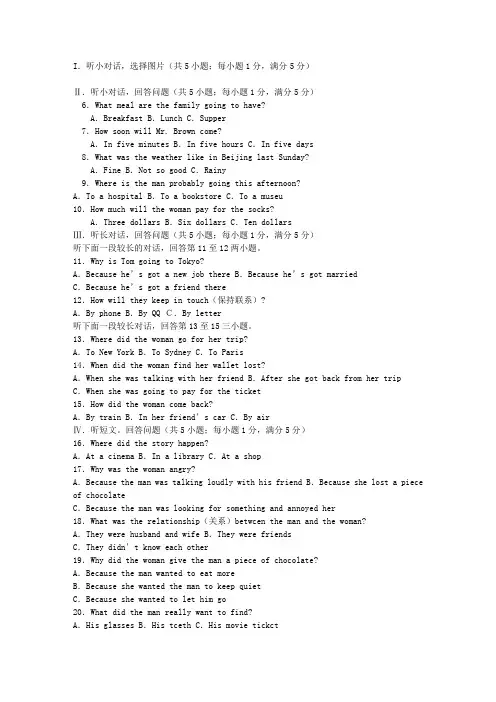
I.听小对话,选择图片(共5小题;每小题1分,满分5分)Ⅱ.听小对话,回答问题(共5小题;每小题1分,满分5分)6.What meal are the family going to have?A.Breakfast B.Lunch C.Supper7.How soon will Mr. Brown come?A.In five minutes B.In five hours C.In five days8.What was the weather like in Beijing last Sunday?A.Fine B.Not so good C.Rainy9.Where is the man probably going this afternoon?A.To a hospital B.To a bookstore C.To a museu10.How much will the woman pay for the socks?A.Three dollars B.Six dollars C.Ten dollarsⅢ.听长对话,回答问题(共5小题;每小题1分,满分5分)听下面一段较长的对话,回答第11至12两小题。
11.Why is Tom going to Tokyo?A.Because he’s got a new job there B.Because he’s got marriedC.Because he’s got a friend there12.How will they keep in touch(保持联系)?A.By phone B.By QQ C.By letter听下面一段较长对话,回答第13至15三小题。
13.Where did the woman go for her trip?A.To New York B.To Sydney C.To Paris14.When did the woman find her wallet lost?A.When she was talking with her friend B.After she got back from her trip C.When she was going to pay for the ticket15.How did the woman come back?A.By train B.In her friend’s car C.By airⅣ.听短文。
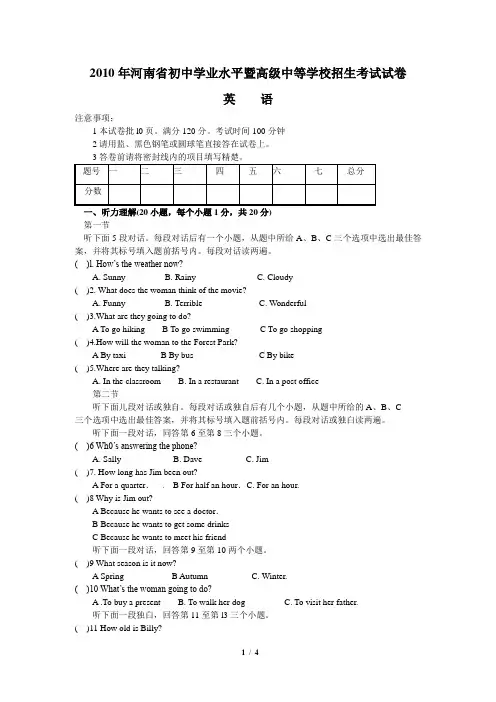
2010年河南省初中学业水平暨高级中等学校招生考试试卷英语注意事项;1本试卷批l0页。
满分120分。
考试时间100分钟2请用监、黑色钢笔或圆球笔直接答在试卷上。
3答卷前请将密封线内的项目填写精楚。
题号一二三四五六七总分分数一、听力理解(20小题,每个小题1分,共20分)第一节听下面5段对话。
每段对话后有一个小题,从题中所给A、B、C三个选项中选出最佳答案,并将其标号填入题前括号内。
每段对话读两遍。
( )l. How’s the weather now?A. SunnyB. RainyC. Cloudy( )2. What does the woman think of the movie?A. FunnyB. TerribleC. Wonderful( )3.What are they going to do?A To go hikingB To go swimmingC To go shopping( )4.How will the woman to the Forest Park?A By taxiB By busC By bike( )5.Where are they talking?A. In the classroomB. In a restaurantC. In a post office第二节听下面儿段对话或独自。
每段对话或独自后有几个小题,从题中所给的A、B、C三个选项中选出最佳答案,并将其标号填入题前括号内。
每段对话或独白读两遍。
听下面一段对话,同答第6至第8三个小题。
( )6 Wh0’s answering the phone?A. SallyB. DaveC. Jim( )7. How long has Jim been out?A For a quarter.B For half an hour.C. For an hour.( )8 Why is Jim out?A Because he wants to see a doctor.B Because he wants to get some drinksC Because he wants to meet his friend听下面一段对话,回答第9至第10两个小题。
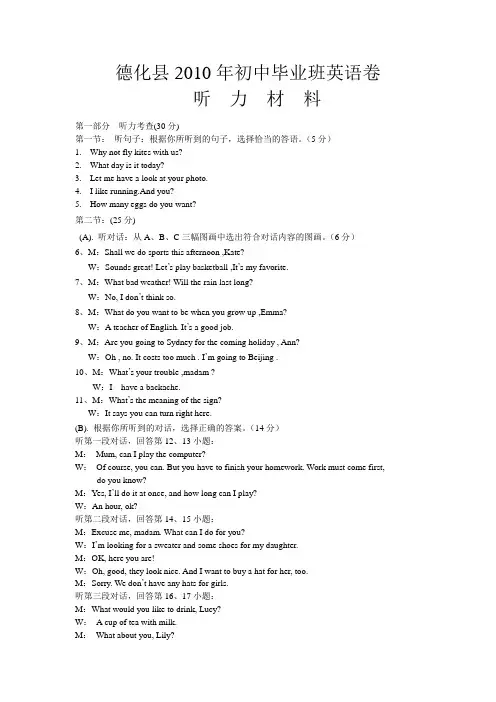
德化县2010年初中毕业班英语卷听力材料第一部分听力考查(30分)第一节:听句子:根据你所听到的句子,选择恰当的答语。
(5分)1.Why not fly kites with us?2.What day is it today?3.Let me have a look at your photo.4.I like running.And you?5.How many eggs do you want?第二节:(25分)(A). 听对话:从A、B、C三幅图画中选出符合对话内容的图画。
(6分)6、M:Shall we do sports this afternoon ,Kate?W:Sounds great! Let’s play basketball ,It’s my favorite.7、M:What bad weather! Will the rain last long?W:No, I don’t think so.8、M:What do you want to be when you grow up ,Emma?W:A teacher of English. It’s a good job.9、M:Are you going to Sydney for the coming holiday , Ann?W:Oh , no. It costs too much . I’m going to Beijing .10、M:What’s your trouble ,madam ?W:I have a backache.11、M:What’s the meaning of the sign?W:It says you can turn right here.(B). 根据你所听到的对话,选择正确的答案。
(14分)听第一段对话,回答第12、13小题:M:Mum, can I play the computer?W:Of course, you can. But you have to finish your homework. Work must come first, do you know?M:Yes, I’ll do it at once, and how long can I play?W:An hour, ok?听第二段对话,回答第14、15小题:M:Excuse me, madam. What can I do for you?W:I’m looking for a sweater and some shoes for my daughter.M:OK, here you are!W:Oh, good, they look nice. And I want to buy a hat for her, too.M:Sorry. We don’t have any hats for girls.听第三段对话,回答第16、17小题:M:What would you like to drink, Lucy?W:A cup of tea with milk.M:What about you, Lily?W:A glass of orange juice, please.M:And you, Mary?W:Um, Coffee, please.听第四段对话,回答第18、19小题:M:Shall we go hiking tomorrow?W:Good idea. Can I take my two friends with me?M:Certainly. But they have to get up early. We’ll start at six o’clock in the morning, because the weather is hot听第五段对话,回答第20、21小题:M:Hello, Can I speak to Mr. Green?W:I’m afraid he is at a meeting now.M:Can I leave a message?W:Yes, please.M:Please ask him to give me a call at this number 3336793.W:Sure, I’ll give it to him.M:Thank you very much. Goodbye.W:Goodbye.听第六段对话,回答第22、23小题:M:What’s the date today?W:It’s October 23 rd.M:Oh! It’s my cousin’s birthday today. I forgot all about it.W:It’s not too late yet. You still have time to buy her a present now.M:But what shall I buy?W:How about a bag?M:Yea. It’s a good idea. I’m sorry I have to go now.W:OK, see you.听第七段对话,回答第24、25小题:M:Three tickets, please.W:Well, you don’t need to buy three, because your baby is not tall enough to need the ticket. M:Thank you! And what time will the bus start for Guangzhou?W:Mm, it’ll take you three hours and a half, so you’ll arrive in Guangzhou at 9:30.a.m.(C) 听一段对话,回答第26-30小题。
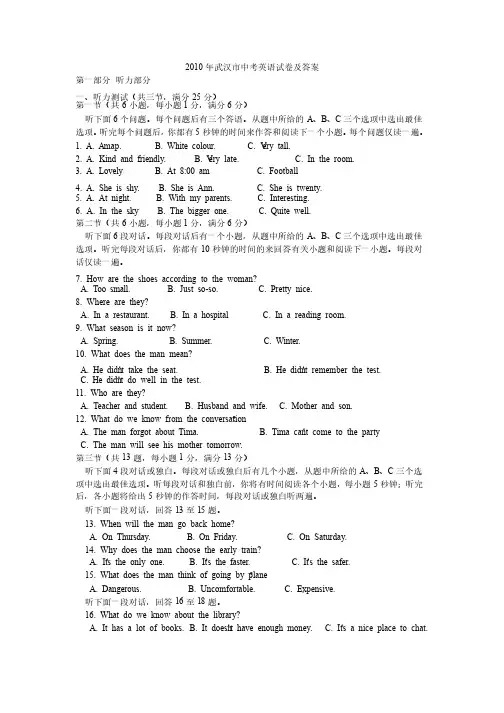
2010年武汉市中考英语试卷及答案年武汉市中考英语试卷及答案第一部分第一部分 听力部分听力部分一、听力测试(共三节,满分25分)分) 第一节(共6小题,每小题1分,满分6分)分)听下面6个问题。
每个问题后有三个答语。
从题中所给的A 、B 、C 三个选项中选出最佳选项。
听完每个问题后,你都有5秒钟的时间来作答和阅读下一个小题。
每个问题仅读一遍。
1. A. A map. B. White colour. C. Very tall. 2. A. Kind and friendly. B. V ery late. C. In the room. 3. A. Lovely B. At 8:00 am C. Football 4. A. She is shy. B. She is Ann. C. She is twenty. 5. A. At night. B. With my parents. C. Interesting. 6. A. In the sky . B. The bigger one. C. Quite well. 第二节(共6小题,每小题1分,满分6分)分)听下面6段对话。
每段对话后有一个小题,从题中所给的A 、B 、C 三个选项中选出最佳选项。
听完每段对话后,你都有10秒钟的时间的来回答有关小题和阅读下一小题。
每段对话仅读一遍。
话仅读一遍。
7. How are the shoes according to the woman? A. Too small. B. Just so-so. C. Pretty nice. 8. Where are they? A. In a restaurant. B. In a hospital C. In a reading room. 9. What season is it now? A. Spring. B. Summer. C. Winter. 10. What does the man mean? A. He didn ‘t take the seat. B. He didn‘t remember the test. C. He didn‘t do well in the test. 11. Who are they? A. Teacher and student. B. Husband and wife. C. Mother and son. 12. What do we know from the conversation ?A. The man forgot about Tima. B. Tima can‘t come to the party . C. The man will see his mother tomorrow. 第三节(共13题,每小题1分,满分13分)分)听下面4段对话或独白。
2010年北京市中考英语试卷(教师版)听力理解1.(1分)【微点】听录音选图.【思路】略【解析】B【点拨】略2.(1分)【微点】听录音选图.【思路】略【解析】2.A【点拨】略3.(1分)【微点】听录音选图.【思路】略【解析】3.A【点拨】略4.(1分)【微点】听录音选图.【思路】略【解析】4.C【点拨】略5.(2分)请听一段独白,完成第5至第6小题.5.How's Kate feeling now?A.Much better.B.Still sick.C.Even worse.6.Which page will Kate read?A.Page 15.B.Page 20.C.Page 25.【微点】长对话理解.【思路】略【解析】5.A 6.C【点拨】略6.(2分)请听一段独白,完成第7至第8小题.7.Where're the speakers?A.In a school.B.In a hospital.C.In a shop.8.What does the woman's son like?A.Books.B.Music.C.Clothes.【微点】长对话理解.【思路】略【解析】7.C 8.B【点拨】略7.(2分)请听一段独白,完成第9至第10小题.9.Who wants to be a doctor?A.Tom.B.Lisa.C.Sam.10.What're the speakers mainly tal about?A.Their jobs.B.Their families.C.Their friends.【微点】长对话理解.【思路】略【解析】9.C 10.B【点拨】略8.(3分)请听一段独白,完成第11至第13小题.11.What did the teacher do after Tim made trouble?A.They always punished him.B.They talked to his parents.C.They often laughed at him.12.Why did Tim lie down with his bike on top of him?A.To get a new bike.B.To make his mother angry.C.To play a joke on his mother.13.What's the conversation mainly about?A.Tim's behavior as a little boy.B.Tim's feeling for his school life.C.Tim's attitude toward his mother.【微点】长对话理解.【思路】略【解析】11.A 12.C 13.A【点拨】略9.(3分)请听一段独白,完成第14至第16小题.14.What can you learn from the speaker's talk?A.Indian movies are the same as Western movies.B.Indian students like learning computer science.C.India has twenty﹣two different national languages.15.What are mentioned about India?A.Movies,inventions and sports.B.Languages,food and invention.C.Weather,languages and movies.16.What's Mark doing?A.Giving some advice.B.Offering an invitation.C.Ma an introduction.【微点】长对话理解.【思路】略【解析】14.B 15.B 16.C【点拨】略10.(4分)听对话,根据所听到的对话内容和提示词语,记录关键信息.对话读两遍.(共8分,每小题2分)【微点】短文理解.【思路】略【解析】17.Peter 18.football 19.kind 20.seven【点拨】略四、单项填空(共15分,每小题1分)从下列各题所给的A、B、C、D四个选项中,选择可以填入空白处的最佳选项.11.(1分)Tom and Mike are good friends._______ often help each other.()A.They B.Them C.Their D.Theirs【微点】代词辨析.【思路】汤姆和迈克是好朋友.他们经常相互帮助.【解析】解答:A;该题考查人称代词的用法.They他们;主格形式;Them他们,宾格形式;Their他们的,形容词性物主代词;Theirs他们的;名词性物主代词;根据句意"汤姆和迈克是好朋友"推测"他们经常相互帮助".后面的句子缺少主语,应该用人称代词的主格,人称代词的主格用I/he/she/it/they.这里是复数应该用they.故选A.【点拨】对句意作出正确判断,解析出所填内容在句中做的成分,根据语法要求选择正确解答..12.(1分)Some volunteers from Beijing arrived in Shanghai ________ April 29 to work for the World Expo.()A.on B.at C.of D.to【微点】时间介词.【思路】一些来自北京的志愿者在4月29日抵达上海,为世博会服务.【解析】解答:A 联系汉语意思,根据April 29可知,此处时间是几月几号,根据已有的知识储备可知,这是一个具体的时间.又知时间介词in后常接不具体时间,如年、月;on后常接具体时间,如几月几日,星期;at后常接时刻,如几点几分.所以此处应用on.故选A.【点拨】此题考查时间介词的用法.做题时,联系汉语意思,抓住时间词,再根据已有的对时间介词的储备,得出准确解答.13.(1分)The reading room ________ very quiet.I enjoy reading books there.()A.am B.is C.are D.be【微点】系动词.【思路】阅览室很安静.我喜欢在那里看书.【解析】解答:B;该题考查主谓一致.根据句中的主语The reading room是单数,可知谓语动词要用单数is.故选B.【点拨】根据句中信息正确理解句意,对所缺的系动词作出正确解析,从而作出正确解答.14.(1分)﹣______ schoolbag is this?﹣I guess it's Lily's.()A.Which B.Whose C.What D.Who【微点】疑问代词.【思路】﹣这是谁的书包?﹣我猜它是莉莉的.【解析】解答:B.根据关键词Lily's可知,问句是问这是谁的书包,which,哪一个;whose,谁的;what,什么;who,谁;故选B.【点拨】本题考查疑问代词的用法,解决此类问题的关键是根据标志词和提示词来确定疑问代词,在不同的语言环境中达到熟练掌握的目的.15.(1分)﹣Which color do you like ________,blue or green?﹣Blue.()A.good B.better C.best D.the best【微点】形容词的比较级和最高级.【思路】﹣﹣你更喜欢哪种颜色,蓝色还是绿色?﹣﹣蓝色.【解析】解答:B 根据blue or green可知,这属于两者比较,所以此处应用比较级.又知good意为好的,是形容词原级;better意为更好的,是good的比较级;best/the best 意为最好的,是good的最高级.所以此处应用better.故选B.【点拨】此题考查比较级的用法.做题时,抓住题干中的关键细节,判断所需级别,两者比较用比较级,三者以上最高级,无比较用原级;再解析选项的含义及用法,得出准确解答.16.(1分)There is ________ wrong with this computer.It doesn't work well.()A.something B.anything C.everything D.nothing【微点】不定代词.【思路】这台电脑有些问题,它不能很好的工作.【解析】解答A something一点儿,一些;anything任何;everything一切;nothing 没有.根据后文it doesn't work well它不能很好的工作,可知前文是说电脑有一些问题,表肯定.故解答选A.【点拨】解答本题需考生掌握各个代词的意思,再根据语境选择正确选项.17.(1分)﹣________ you turn down your radio,please?﹣Yes,I can.()A.May B.Need C.Must D.Can【微点】情态动词.【思路】﹣﹣能把收音机声音调小点吗?﹣﹣是的,我能.【解析】解答:D.根据Yes,I can,可知上面的问句应该是一个一般疑问句,这里回答用了can,那么问句也应该是can引导的.故选D.【点拨】本题考查了情态动词的用法.解答时注意根据答语来选择问句的引导词.18.(1分)﹣Would you like to go to the concert with me?﹣I'd love to,________ I'm afraid I have no time.()A.so B.or C.and D.but【微点】连词辨析.【思路】﹣你愿意和我一起去听音乐会吗?﹣我愿意,但是我害怕我没有时间.【解析】解答:D;so于是;or或者;and和;but但是;根据答语"I'd love to我愿意"和"I'm afraid I have no time我害怕我没有时间"可知二者之间数转折关系;故用but;故选D.【点拨】连词在中考中涉及到的很多,平时学习过程中,掌握连词的意思,及所表示的关系是至关重要的,这种关系的判断可以通过句子意思的理解来选择恰到的连词.19.(1分)﹣What's your father doing now?﹣He ______ the room()A.cleaned B.cleansC.has cleaned D.is cleaning【微点】现在进行时.【思路】翻译:你爸爸现在在做什么?他在打扫房间.【解析】解答:D.根据语境:问句中有now,所以该用的是现在进行时,现在进行时陈述句的构成:主语+be+动词ing+其它,故选D.【点拨】本题主要考查的是现在正在发生的动作该用现在进行时.20.(1分)Tom will call me as soon as he ________ home.()A.gets B.has got C.got D.will get【微点】时态辨析.【思路】Tom一到家就会给我打电话.【解析】解答:A 根据as soon as(一…就…)可知,这是条件状语从句,遵循主将从现原则,所以此处应用一般现在时.又知gets是一般现在时;has got是现在完成时;got 是一般过去时;will get是一般将来时.所以此处应用gets.故选A.【点拨】此题考查一般现在时.做题时,抓住关键信息,解析句式用法,最终判断所需时态,然后解析各个选项,得出解答.21.(1分)Granny often tells us _______ water in our daily life.()A.save B.saving C.to save D.saves【微点】不定式.【思路】翻译:奶奶经常告诉我们在我们的日常生活中节约用水.【解析】解答:C 根据语境可知tell sb.to do sth.是固定词组固定搭配,表示告诉某人去做某事.所以用to save,故选:C【点拨】本题考查不定式.指由to加上动词原形(而且只能是动词原形)所构成的一种非限定性动词,但在有些情况下to可以省略.动词不定式在语法功能上可作主语、宾语、宾语补足语、表语、定语和状语.22.(1分)Rose came to Beijing in 2002.She _______ here for eight years.()A.was living B.live C.will live D.has lived【微点】现在完成时.【思路】Rose在2002年来北京,她已经住在这儿八年了.【解析】解答:D.根据关键词for eight years可知,本句是现在完成时态,for和since 是现在完成时态的标志词,其构成为:has/have+过去分词,主语she是第三人称单数形式,所以助动词用has,live的过去分词为lived,故选D.【点拨】解决此类问题的关键是根据关键词和时间状语来确定动词的时态,在不同的语言环境中达到熟练掌握的目的.23.(1分)It _______ heavily when I left the cinema.()A.rains B.will rainC.is raining D.was raining【微点】过去进行时.【思路】翻译:当我离开电影院时雨下得很大.【解析】解答:D.结合语境可知:我离开电影院,用的是过去时,雨下得很大,指的是我离开电影院那时雨正在下得很大,因此应该用过去进行时,过去进行时的构成:主语+was/were+动词ing+其它,故选D.【点拨】本句主要考查的是过去某时正在进行的动作用过去进行时.24.(1分)The road ________ last year.()A.builds B.built C.was built D.is built【微点】一般过去时的被动语态.【思路】这条马路是去年建成的.【解析】解答:C 根据last year可知,这是表示过去的时间状语,所以运用一般过去时态;又因为主语the road是动词build的承受者,应该用被动语态.一般过去时态的被动语态的构成是:was/were+动词的过去分词,主语是单数,所以用助动词用was,故选C.【点拨】判断动词的时态,要通过所给的时间状语或语境去判断动词存在的状态;判断动词的语态,要看看主语是谓语动词的执行者还是承受者.此题注意过去分词的写法.25.(1分)﹣Do you know _______ the Capital Museum?﹣Next Friday.()A.when will they visit B.when they will visitC.when did they visit D.when they visited【微点】宾语从句.【思路】翻译:﹣﹣你知道他们什么时候将要参观首都博物馆吗?﹣﹣下周五.【解析】本题考查宾语从句,宾语从句需采用陈述语序,A、C是疑问语序排除;根据答语Next Friday可知是将来时,排除D.所以选B【点拨】本题考查宾语从句,做此类题时,首先看从句是否采用了陈述语序;其次根据上下句判读时态.五、完形填空(共12分,每小题12分)阅读下面的短文,掌握其大意,然后从短文后各题所给的A、B、C、D四个选项中,选择最佳选项.26.(12分)It was yearbook day and we were given an hour to sign each other's yearbooks in the cafeteria.I was president of the class and I played sports.When I sat down at a table,people started to come over to get their yearbooks signed and to sign (36)A.Among them,a weak boy with ugly teeth and thick glasses kept sha .I had seen him around,and I knew he was always laughed at.He seemed (37)B of himself,and was so pale that it (38)D us to look at him.He came up and asked me nervously,"Can you sign this?"I took his yearbook but I didn't know (39)D to write.I saw that there was the name "Ricky Sanders" written on the front of it.So I wrote:I put down the yearbook and turned around to get some signatures from some of my friends when I (40)B my yearbook was gone.I saw that Ricky had sat down with my yearbook."What are you doing?"I asked him.He looked up calmly(平静地)and (41)D said "Sign!"My friends broke into a loud laugh,and I saw that he was carefully frying to put a signature in my yearbook.He hadn't even finished the "R" yet.I thought for a while and(42)A to let him sign.It took him nearly five minutes to sign and when I got my yearbook back,there was a very shaky "RICKY".He hugged(紧抱)his yearbook and (43)A.I couldn't help but smile back at him.In that moment,my (44)C changed completely.I gave him a high five and suddenly everyone at my table wanted his signature.He was asked politely to write in their yearbooks and the signature (45)B of his yearbook were filled up.He was smiling so big that it lit up the whole room.I changed school the next year,and I never saw Ricky again.However,I will never forget the day that he became the most (46)C guy in school.Whenever I'm (47)D,I still look back at that yearbook.36.A.mine B.his C.ours D.theirs37.A.unafraid B.unsure C.proud D.tired38.A.worried B.surprised C.taught D.hurt39.A.how B.which C.where D.what40.A.saw B.noticed C.thought D.believed41.A.still B.ever C.even D.just42.decided B.meant C.began D.prepared43.A.smiled B.waited C.left D.rose44.A.sense B.value C.attitude D.idea45.A.lists B.pages C.boxes D.tables46.A.different B.patient C.popular D.important47.A.away B.out C.behind D.down【微点】说明文.【思路】那天是写年鉴的日子,我们有一个小时的时间在咖啡厅为彼此写下留言.我是班上的负责人,又是名运动员.所以我一坐在桌边就有人过来跟我相互签名.在这些人当中,有一个有气无力的男生一直在发抖,他牙齿参差不齐,还戴着厚厚的镜片.我曾见过他,知道他总是被当作嘲笑对象.他看上去毫无自信,面色惨白得简直让人看不下去.他走上前来并十分紧张地开口"能帮我签一下这个吗?"我接过他的年鉴本却不知道该写些什么.最后在顶端看到他的名字"瑞奇桑德拉",于是我提笔:我觉得你真的很不错,希望你有一个乐趣丰富的暑期之旅签名:威尔当我放下他的年鉴预备找其他朋友给我签名的时候,却找不到我的了.随后我就看到瑞奇正拿着我的年鉴本坐在一边,我问他"你干嘛?"他抬起头十分镇定地回答"签名!"我的朋友们顿时爆发出一阵狂笑.我看着他小心翼翼地试图在我的年鉴本上写下一个签名,他甚至连第一笔都还没写出来.但我想了想还是决定让他签完.将近过了五分钟,他才签完名.当我拿回我的年鉴本时,只看见上面一个扭扭曲曲的"瑞奇".他搂着他的年鉴本微笑着,我情不自禁地也朝他微笑了.就在那一刻,我对他的态度产生了360度的转变.在我与他击掌的瞬间,桌子前的每个人都拥过去找他要签名.大家伙儿十分有礼貌地纷纷邀请他在自己的年鉴本上留言,而他年鉴本的签名页上也被大家签满了.他的笑容是那样的愉悦,整个房间都因此变得明媚.一年之后我就转学了,也再没见到过瑞奇.但是我永不会忘记那天他成为了全校最受欢迎的同学.也一直到现在,每当我觉得低落之时都会再翻开那本年鉴看看.【解析】36.A 代词考查.结合When I sat down at a table,people started to come over to get their yearbooks signed and to sign 可知是拿着过来找我签名,故用mine,故解答是A.37.B 形容词考查.结合I knew he was always laughed at可知总是被嘲笑,故可知是不够自信unsure,故选B.38.D 形容词考查.结合was so pale that it (38)us to look at him是表达是如此的苍白,我们都看不下去,故hurt受伤,故解答是D.39.D 疑问词考查.结合I took his yearbook but I didn't know 可知是不知道写什么,know 后加疑问句+to do 结构,故what什么,故解答是D.40.B 动词考查.结合my yearbook was gone可知是注意到我的不见了,故notice注意,故解答是B.41.D 副词考查.结合He looked up calmly(平静地)and (41)said "Sign!"只是平静的说"签名",故just只是,故选D.42.A 动词考查.结合下文It took him nearly five minutes to sign and when I got my yearbook back可知他签名了,可知作者决定让他签名了,故decide决定,故解答是43.A 动词考查.结合I couldn't help but smile back at him.可知是微笑smile,故选A.44.C 名词考查.结合上下文gave him a high five and suddenly everyone at my table wanted his signature可知这里是说态度转变了,故attitude态度,故选C.45.B 名词考查.跳过空格推知句意是说年鉴的页面都是签名,故pages页面,故解答是B.46.C 形容词考查.结合上文He was asked politely to write in their yearbooks and the signature pages of his yearbook were filled up.He was smiling so big that it lit up the whole room.可知他是受欢迎的,故popular受欢迎的,故选C.47.D 短语考查.跳过跳过空格推知句意是说I still look back at that yearbook当我情绪低落的时候,故down心情不好,故选D.【点拨】通览全文,领会大意,揣摩话题.解题时应先跳过空格通览全文,了解对话大意,根据对大意的把握,判定语境,揣摩话题.六、阅读下列短文,根据短文内容,从短文后各题所给的A、B、C、D四个选项中,选择最佳选项.(共26分,每小题6分)27.(6分)Here are two letters to George and his replies.48.Alice is worrying about B.A.her friendsB.her marksC.her heightD her weight49.Bob should A according to George's letter.A.take more exerciseB.talk to his friendsC.join a basketball teamD.learn some French.50.George advises Alice to talk to B for help.A.her motherB.her teacherC.Bob's teacherD.Bob's friends.【微点】教育文化类阅读.【思路】这篇短文主要是鲍勃和爱丽丝给乔治写信请求乔治的帮助以及乔治分别给他们的回信.【解析】B.推理判断题.根据第三封信I'm learning French but I don't get good marks.I don't know why.描述可知,Alice正在学法语,但他取得不了好成绩.故选B.A.细节理解题.根据第二封信Plan your meals with your mum,and she can help you lose weight.Also,try to take more exercise.描述可知和你的妈妈计划计划你的饭,她能帮你减肥,你也努力多做锻炼.故选A.50:B.细节理解题.根据第四封信可知,You can talk to your teacher and ask her what you should do to get a better grade.你可以和你的老师谈谈,询问他应该如何取得更好的成绩.故选B.【点拨】本文是一篇日常生活类阅读,题目涉及多道细节理解题,做题时结合原文和题目有针对性找出相关语句进行仔细解析,结合选项选出正确解答.推理判断也是要在抓住关键句子的基础上合理的解析才能得出正确的解答.28.(6分)The population of the Earth is growing faster.It is important that we look after the Earth.We need it!The Earth gives us a lot of things.We also give the Earth a lot,but some of the things are not good.In nature,when something dies,other animals and plants get food from it.Every animal or plant gives food for other animals or plants.However,animals can't get food from many of the things that we‘give' the Earth.Animals and plants can't eat metal,plastic and glass.These things will stay in the ground for many,many years.Some rubbish is very dangerous for plants and animals.In some places,many animals live together.One animal makes food for many more animals.If we put rubbish and chemicals in the water,the plankton(浮游生物)can die.If there isn't any plankton,many animals have nothing to eat.So what can we do?Don't leave any rubbish in the countryside! Don't make so much rubbish!51.The Earth gives us A.A.foodB.rubbishC.chemicalsD.pollution52.When something dies in nature,C.A.water and grass are pollutedB.plastic and wood become foodC.other animals and plants get foodD.metal and glass stay in the ground53.We must D to look after the Earth.A.put metal in the groundB.use more woodC.keep frogs in the waterD.make less rubbish【微点】史地常识类阅读.【思路】地球的人口增长速度越来越快,因此我们照顾好地球就变得非常重要,因为我们需要它.地球给了我们很多东西.我们也给了地球很多东西,但是有些东西并不是有益的.在自然界,一些东西死亡,其他动植物会从中获取食物,每个动植物都给予其他动植物食物,然而,动物们不能从我们给地球的东西中获取食物,动植物不能吃属,塑料和玻璃.这些东西将在地里存在非常长的时间.一些垃圾对于动植物是非常危险的,在一些地方动物生活在一起,某种动物为其他动植物提供食物.如果我们释放垃圾和化学品到水中,浮游生物会死亡.而如果没有了浮游生物,许多动物将死于饥饿.那么我们要怎么做?不要再野外丢弃任何垃圾!不要制造那么多垃圾!【解析】51.A 52.C 53.DA 根据The Earth gives us a lot of things.及下文描述,可知地球为我们提供食物,故选A.C 根据In nature,when something dies,other animals and plants get food from it.描述,可知选C.D 根据So what can we do?Don't leave any rubbish in the countryside! Don't make so muchrubbish!描述,可知我们应该少产生废物,故选D.【点拨】首先要仔细阅读短文,掌握大意,然后结合具体的题目,再读短文找出相关的信息,就可以确定正确解答.29.(6分)Many textbooks are not written in the kind of English that we speak every day.In fact,sometimes the reading is so difficult that it almost seems like a foreign language.In a way,it is ﹣the language of science.You should not expect to be able to read a difficult science passage the same way you read an interesting story;you should not expect to read it easily and all at once.Instead,you may have to read it several times through,catching on the meaning of difficult words,going back over difficult sentences,and finally putting the whole thing together.Do not be discourages if the whole passage don't make sense to you at first.You need to pick it apart patiently until you can understand it.These are the steps to follow when you are reading something difficult:1.Start to read normally until you run into a sentence that doesn't make sense to you.2.When a sentence doesn't make sense,go back and read it again more slowly.3.Look for any word you don't know in the sentence.Try to understand their meanings using word parts and context clues(上下文线索).If necessary,look them up in the dictionary.4.Look at the next few sentences to see if they explain more about the sentence you are wor on.Do not read very much farther ahead until you understand what is being said.5.Finally,read the sentence again.Try to put it into simpler words.6.Read through the passage once.Try to understand all the hard parts well.Then read the whole passage once more at a usual speed.This helps you to put all ideas together.The stops sound a lot harder than they are.It is really just the normal way good readersunderstand anything that is difficult to read.After you have done the best you can this way,you should always feel free to ask for help from your teacher,if you have one.54.The underlined phrase "run into" means B.A.work outB.come acrossC.look intoD.pass by55.From the passage,we can know B.A.we should look up new words before readingB.it is sometimes difficult to read a science passageC.the six steps are helpful in learning spoken EnglishD.interesting stories help readers to improve their English56.The massage is mainly about C.A.steps of studying scienceB.difficulties in reading scienceC.ways of reading science passagesD.researches on science and English.【微点】教育文化类阅读.【思路】文章大意:主要描述在我们平时看的英语文章中,可能会遇到比较难的文章,尤其是科普文章,本文主要告诉我们如何阅读比较困难的文章,并介绍了几个方法.【解析】54﹣BBC54题解答:B 猜词题:根据第三段:Start to read normally until you run into a sentence that doesn't make sense to you前面说开始正常的读,后面说不懂的单词,应该是直到遇到.选B55题解答:B 细节题:从第一段的句子:In a way,it is﹣the language of science.You should not expect to be able to read a difficult science passage the same way you read an interesting story;可知阅读科普文章有时比较难.选B56题解答:C 主旨题:从第二段的句子:These are the steps to follow when you are reading something difficult:可知这篇文章讲的是阅读科普文章的方法.选C【点拨】本文是一篇教育文化类阅读,题目涉及多道细节理解题,做题时结合原文和题目有针对性找出相关语句进行仔细解析,结合选项选出正确解答.推理判断也是要在抓住关键句子的基础上合理的解析才能得出正确的解答.30.(8分)In the West,some people believe that personality can be predicted according to the time of the year the person was born.From China comes the belief that the year of birth influences one's personality.In the past century,a new belief has arisen:the idea that personality is related to one's ABO blood type.People with blood type A,for example,are considered more likely to be serious,hard﹣wor ,and quiet,while people with blood type O are likely to be popular and outgoing,yet often unable to finish what they start.Though this belief continues to be strong,some people question whether it is true.The blood﹣type personality theory(理论)started in Japan in 1927 when Furukawa Takehi noticed personality similarities and differences among his workers.This idea soon went out of fashion,but was brought back by a Japanese television host named Toshitaka Nomi in the 1970s.The belief is still strong in Japan and is increasingly popular in neighboring countries.Some young Koreans have taken to the theory.A recent study showed 76 percent of Koreans aged between 13 and 64 believing in the blood﹣type personality connection.Though most Asians might believe in the blood﹣type theory,for many it seems harmless and not something to be taken too seriously.Is the belief true?The scientists in Asia largely dismiss the belief as a modern﹣day superstition(迷信).Most studies have failed to find any strong connection between blood and personality.Generally,scientists warn against ma predictions or important decisions based on this questionable theory.57.The writer uses blood type A and O as an example to explain D.A.the difference between to two blood typesB.the relationship between the two blood typesC.the influence of blood type on one's behaviorD.the connection between personality and blood type58.What does the underlined sentence in Paragraph 2 mean?CA.It was lightly believed.B.It was brought to them.C.They liked and accepted it.D.They stole the idea from others59.Which of the following is true according to the passage?AA.Most scientists in Asia don't believe in the theory.B.The blood﹣type theory began in Japan in the 1970s.C.The blood﹣type personality theory is about blood type.D.People don't change their personality to match the theory.60.What is the best title for the passage?CA.Is the blood﹣type theory poplar?B.Is the personality changeable?C.Is it in your blood?D.Is it in you mind?【微点】科普知识类阅读.【思路】本文讲述的是个性和血型的关系.有些人认为人格是与一个人的血型有关,但在亚洲,大部分科学家认为这个是现代迷信.大多数研究都没有发现血型和个性之间有强烈的联系.【解析】57.D 细节理解题.根据第一段的句子:the idea that personality is related to one's ABO blood type.可知用A和O血型是为了说明血型和性格有关.故选D.58.C 句意理解题.根据后面的句子:A recent study showed 76 percent of Koreans aged between 13 and 64 believing in the blood﹣type personality connection.可知人们喜欢并接受这种说法.故选C.59.A 细节理解题.根据最后一段的句子:The scientists in Asia largely think the belief as a modern﹣day superstition(迷信).可知亚洲的科学家不相信这个理论.故选A.60.C主旨大意题.根据文章内容The blood﹣type personality theory(理论)started in Japan in 1927 when Furukawa Takehi noticed personality similarities and differences among his workers可知本文讲的是个性和血型的关系,故选C.【点拨】做题时要在理解好文意的基础上,与题目有机的结合,从文章中找到相关细节性的句子与选项细细比对,进行选择或推理判断,选出符合文章内容的正确选项.做题注意灵活,有时可采用排除法或直选法确定出最终解答.七、阅读短文,根据短文内容,从短文的五个选项中选出能填入空白处的最佳选项.选项中有一个选项为多余选项.(共8分,每小题8分)31.(8分)A funny thing happened to my sister Tina last month.She lives in Japan and teaches English.In Japan,people don't usually wear their outdoor shoes in the house or in school,anda lot of buildings have places for shoes.So her school has a special place for shoes.(61)ATina teaches English in the evening.One Friday,she went to school,and she put her shoes in the shoe box﹣as usual.Then she had an interesting spoken English class with her students.(62)D But to her surprise,her shoes weren't in the box.There was only one pair of those there,and they weren't her shoes! She had to get home in a hurry.(63)C On Monday,at her next English class,her shoes were in a shopping bag on her desk! There was a note that said,"I'm so sorry.I took your shoes by mistake!"(64)E Somebody felta lot of shame!A.It's a shoe box.B.Tina is my sister.C.So she put on the shoes and left.D.After class she got ready to leave.E.But there was no name on the note.【微点】阅读填空.【思路】全文大意:上个月我的妹妹Tian遇到一件有趣的事.她住在日本教英语.在日本,人们在家或在学校不穿室外的鞋,许多楼上有放鞋的地方.她的学校也有专门放鞋的地方.是一个鞋盒子.Tina在晚上教英语,周五的一天,她去学校,像往常一样把鞋放在鞋盒里.她和学生上了一节生动有趣的英语口语课,下课后准备离开,令她惊讶的是,她的鞋不在盒子里.那里只有一双别人的鞋.她不得不赶紧回家.所以她穿上鞋离开了.周一的时候,她的鞋被装在购物袋里放在了她的课桌上.有一个纸条上面写道"对不起,我错拿了你的鞋."但是纸条上没有写名字.有人感到很羞愧.【解析】解答:61.A 推理判断题根据上文In Japan,people don't usually wear their outdoor shoes in the house or in school,and a lot of buildings have places for shoes可知在日。
2010年四川省成都市中考英语试题A卷I(选择题85分) 第一部分听力测试(共25小题,计25分)一、听句子,根据所听到的内容选择正确答语。
每题念两遍。
(共6小题,每小题1分;计6分)1. A。
I won't go。
B. Have a good time! C. Good idea!2. A. Nice to hear it.B. Thank you very much。
C. I will work much harder.3。
A. That's all right。
B。
Why are you so late? C. I'm sorry,too。
4. A。
Yes,please。
B. No, you can't. C. Yes, this is my seat。
5. A. You’d better have a rest.B. I’m sorry to hear that。
C. Be careful。
6. A. Glad to be your friend。
B. Is that true?C。
Nice to meet you.二、听句子,选择与你所听到的句子意思相符合的图片,并将代表图片的字母填在相应位置上。
每题念两遍。
(共4小题,每小题1分;计4分)三、听对话,根据对话内容及问题选择正确答案。
每题念两遍。
(共10小题,每小题1分;计10分)11。
A. Music。
B。
English. C. Math.12。
A. Rainy. B. Fine. C. Sunny。
13. A. It’s 5:30。
B. It's 6:00. C. It's 6:30.14. A. At a library。
B。
At a bookstore。
C。
At home。
15. A。
Father and daughter。
B。
Husband and wife. C。
Mother and son。
英语作文常用谚语、俗语1、A liar is not believed when he speaks the truth. 说谎者即使讲真话也没人相信。
2、A little knowledge is a dangerous thing. 一知半解,自欺欺人。
3、All rivers run into sea. 海纳百川。
4、All roads lead to Rome. 条条大路通罗马。
5、All work and no play makes Jack a dull boy. 只会用功不玩耍,聪明孩子也变傻。
6、A bad beginning makes a bad ending. 不善始者不善终。
7、Actions speak louder than words. 事实胜于雄辩。
8、A faithful friend is hard to find. 知音难觅。
9、A friend in need is a friend indeed. 患难见真情。
10、A friend is easier lost than found. 得朋友难,失朋友易。
11、A good beginning is half done. 良好的开端是成功的一半。
12、A good beginning makes a good ending. 善始者善终。
13、A good book is a good friend. 好书如挚友。
14、A good medicine tastes bitter. 良药苦口。
15、A mother's love never changes. 母爱永恒。
16、An apple a day keeps the doctor away. 一天一苹果,不用请医生。
17、A single flower does not make a spring. 一花独放不是春,百花齐放春满园。
18、A year's plan starts with spring. 一年之计在于春。
2010年中考英语科试题听力材料I.1.Lingling likes singing very much.2. What a sunny day today! Let’s go out for a picnic.3. Mum, please take a rest and have a cup of tea.4. Open the window, please. It’s hot in the room.5. Mike is doing his homework.II.6. Thank you for your help.7. Excuse me, may I speak to Miss Green?8. Mike passed the English exam this time.9. What’s the weather like today?10. Who is taller, Mary or Tom?III.11. M: Hi, Jane, do you know the girl over there?W: Yes, she is my classmate, Ann. She is new here. 12. W: Maria, did you go to the zoo last night?M: No, I went to the cinema.13. W: What’s the matter with you, Mr. Smith?M: I am not feeling well. I don’t want to eat any things.14. M: The meeting will begin at 10 o’clock.W: Now it’s half past nine.M: Don’t worry. We still have time.15.W: What kind of music do you like, Jack?M: I like pop music. What about you, Lucy?W: I prefer light music.IV.My name is Li Hong. I began to learn English when I was ten years old. I thought it was interesting at first, and I hoped to learn it well. Later, I found it was difficult to remember new words. My English teacher, Mr. Zhao, told me a good way to remember words. He asked me to copy all the new words in a notebook. I brought it with me and often looked at it. I also tried to talk with my classmates in English. Of course, I made some mistakes sometimes. But I went on practicing. Now I am really good at speaking English.海南省2010年初中毕业生学业考试英语科试题参考答案听力部分I.1~5 DCBEAII.6~10 CCBACIII.11~15 CBACAIV.16~20 ACBAB笔试部分V.21~25 CACBC 26~30 BAABC 31~35 ABABCVI.36~40 CABAB 41~45 ACBACVII.A)46~50 BCBABB)51~55 BCACAC)56~60 BABCAVIII.61~65 DBAEGIX.A)66. actor 67. yourself 68. laughing 69.across 70. children’sB)71. thirsty 72. waste 73. dream 74. bedrooms 75. encourageX.A)76. We are at home on Saturday evening.77. Mother is washing dishes.78. Father is reading the newspaper.79. Grandparents are watching TV and drinking tea.80. I am doing my homework.B)Recently the activity, “Building Harmonious Society and Safe School”, has been on in our school. Great changes have taken place. At school,we get on well with our teachers and classmates. And we also obey the school rules. We listen to the teachers carefully in class and finish our homework on time. What’s more, we keep our classroom clean and never spit in public. At home, we help our parents do some housework. As for safety, we obey the traffic rules and help old people to cross the street. We are polite to others. I think it is very important for us to obey social rules and help each other.If we do so, we can live more happily. The better we do, the more harmonious our society will be.。
2010年中考听力题点拨听力部分(一)情景交际(也叫口语应用)试题根据对话的基本形式是一问一答的特点,通过提供一定的语境,将语言放在交际的实际情景中去考查。
它所涉及的内容多是初中英语课本中出现过的与学生学习、生活相联系、实用性强的内容。
它既考查特定交际场合使用的表达方式,也通过语境考查词汇和语法知识的运用。
近几年中考中情景交际的常考题型有:补全对话选择题、补全对话填空题,其中补全对话填空题难度较大。
一、补全对话选择题的解题思路与技巧(一)题型特点该题型的特点是在情景应答和对话中,抽出其中某些问句或答句,然后提供若干个备选项,要求考生根据情景,选择备选项中正确的形式来补全对话,它主要考查特定情景中某些口语的固定表达形式。
这类试题有的是把一段对话中抽出的若干个句子打乱顺序后放在一个方框内提供给考生,要求考生根据上下文内容,将这些句子重新返回原位,使对话完整。
这类试题难度虽不大,但必须认真仔细方能保证正确无误。
有的试题为干扰考生,在抽出的句子基础上再掺入若干个语法正确、语言通顺且内容也与对话有关的干扰句子用以迷惑考生,意在测试考生的鉴别能力。
有的试题给对话的每个空格提供四个备选项,形式上类同于完形填空,但它提供的是完整的句子,考生必须从中选出符合特定语境和情景的正确答案。
(二)解题技巧1. 通览全文,领会大意,揣摩话题。
解题时应先跳过空格通览全文,了解对话大意,根据对大意的把握,判定语境,揣摩话题。
2. 根据语境,细读选项,选择答案。
在把握话题和语境的基础上,针对对话的每一空白处,细读所提供的选项,认真分析它们之间的异同,依据对话有关情景内容,选择正确的答案。
3. 通盘考虑,前后联想,先易后难。
要从对话整体理解出发,依照上、下问答的逻辑顺序来考虑所选择的答案,不可不顾前后顺序,孤立地就上句就补下句,这样可能出现所补句子符合上文而不符合下文的情况。
要先解决有把握的、容易的,再回头补选较难的。
4. 通读对话,义形结合,验证答案。
将对话补全之后,再将整段对话通读一遍,逐一验证答案。
所选的答案不仅语义上要符合语境,而且要保证语言正确,做到说话得体。
(三)注意事项1. 所补全的对话内容必须能使上、下文连贯一致,因而必须瞻前顾后、全盘考虑,不能仅看上一个问句就选择答句,或仅根据下文中的答句就补全它的问句,否则容易造成逻辑错误。
2. 做题前应注意试题前面是否有中文或英语的背景提示。
这些背景提示是确定话题内容的重要依据,不可疏忽带过。
3. 在选择过程中考生应注意把已选出的选项划去,避免重复选择的错误。
4. 做题时要先易后难,一时难以确定不要勉强先做,否则易造成连锁错误。
(四)例题分析从下边方框中选择恰当的句子完成对话,每个句子只能用一次。
A:Hello! 1B:Yes. What is it?A: 2 Could I borrow your bike again?B:Certainly. 3 Has your bike broken again?A:No. I've lost my key to the bike. But I have to go to see a friend.B:I see. 4A:About four o'clock.B:OK. Here is the key. 5 Bye!A:Thank you. Bye.听力部分(二)二、对话理解的题型解析与解题技巧对话理解题是各省、市中考试卷中必考题型,对话理解题的出题形式是:录音中提供一个小对话或一篇小短文,且在小对话或小短文的末尾加一个问句,要求考生针对此问句从试卷上选出最佳答案。
做对话理解题主要应注意两点:一是要注意听懂小对话或小短文的含义,二是要听懂所提问题。
而在听问题时要特别注意该问题是属于哪个疑问句类型,是一般疑问句、选择疑问句、反意疑问句还是特殊疑问句。
不过从经验上来看,用来提此问题的主要是特殊疑问句。
若所听的是特殊疑问句,那就要注意听清其疑问词。
可以这样说,听懂对话或短文是前提,而抓住问句中的疑问词则是关键。
1.短对话:每道题一段对话即由两人进行的一问一答式的对话,并提出一个问题,根据你所听到的对话和对话后的问题选出能回答所提问题的最佳选项,每两个小对话之间约有10秒钟的时间供你答题和快速阅下一个小题。
要做好这类题,就得在我们听对话和问题,选答案之前,首先要浏览选项,了解有关信息和预测话题,然后要听对话的有关内容,特别注重有关选项的内容。
有些题目涉及到数字、电话号码、时间、日期、天气温度、飞机航班、家庭地址等,我们就有必要听时做一点记录,还要带着问题听:谁(who),什么事(what),何时(when),何地(where),怎样(how),为什么(why)等,这样人们才能提高答题的正确率。
例1.根据你所听到的对话和对话后的问题选择正确答案。
()1.A. Today. B. Every day. C. Yesterday .()2. A. Ann does . B. Jim does . C. Lucy does .录音材料:1.M:Do you have an English class today ?W:Yes , I do . and I also had it yesterday .M:How often do you have an English class ?W:Every day .Question : How often does the girl have an English class ?2.M:Hi , Ann , do you have a dictionary ?W:Sorry , I don’t . But Lucy has one .M:Where is Lucy ?W:She is on the playground .Question :Who has a dictionary ?解析:要做好此类题,首先要浏览选项,了解有关信息和预测话题,然后要听对话的有关内容,第1题可以通过对话的最后两句来选出 every day,故正确选项是B;第2小题可以根据录音中的 Sorry,…but Lucy has one. 来判定选项C是正确的。
例2.听小对话,请从A、B、C三个选项中选择正确的选项。
1. Where’s the man going?A. To a bookshop.B. To a museum.C. To a post office.2. How long will the woman stay in the hotel?A. For two days.B. For three days.C. For four days.录音材料及解析:1. M: Excuse me, could you tell me where the nearest post office is?W: The post office? Yes.Look! It’s just next to the museum over there.M: I see.Thanks a lot.解析:侧重考查学生捕捉、筛选、预测信息的能力,通过第一句话could you tell me where the nearest post office is?我们就很容易的选出正确的选项C;2.M: Good morning. The Great Wall Hotel!W: Good morning! I want to book a double room for three days from June 10th to 12th.从I want to book a double room for three days from June 10th to 12th.这句话中我们可以捕捉两个知识点three days 和 from June 10th to 12th ,通过这两个信息提示我们就不难选出three days,故正确的选项是B。
2.长对话:听一段完整的对话,根据对话内容选出能回答所给几个问题的正确答案或补全表格中所缺的信息,每空一词。
对话一般读两遍或三遍。
例1. 听录音,判断下列各句的正(T)误(F)。
1. Lucy is Tina's best friend, and they never have arguments.2. Tina doesn't like making a telephone to her friend because it's too troublesome.3. It is Lucy's birthday next Sunday.4. Tina will go to Lucy's house with CDs.5. Lucy will be fifteen years old.录音原文:Boy: Hey, Tina. What s wrong. You look unhappy.Girl: I had an argument with my best friend, Lucy. What should I do?B: Well, you could write a letter mad say sorry to her.G: Oh, I don t like writing letters. It is too troublesome.B: Maybe you should call her up.G: No, I don't want to talk about it on the phone.B: Well, you should say you’re sorry.G: Yes, I know I should, but it's not easy. I don't think she can forgive me.B: Oh, I remember it’s her birthday next Sunday. You should go to her house with some flowers. G: Well. That s a good idea. I will buy her fifteen flowers. It will surprise her, I think. B: Fifteen? She will be as old as I.解析: 1. F 根据对话开头女孩解释她不高兴的原因是刚和好朋友Lucy吵架了,可判断题目中的前半句是正确的,但后半句说她们从没争吵过是错误的,所以此句是错误的。